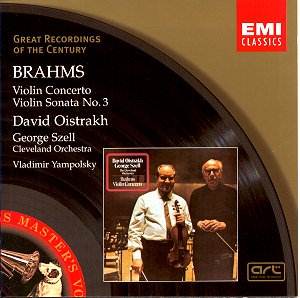The Brahms Violin Concerto was a great favourite
with David Oistrakh. This is his last recording of the work (there
are a total of four), and the marriage of Oistrakh and Szell and
his Clevelanders is magic. Szell was well known for his telepathic
abilities as accompanist, but this is but one facet of this recording.
The opening orchestral arpeggiation is given with such supreme
confidence that one knows that one is in expert hands, and indeed
the superb exposition is matched by intense playing from Oistrakh.
Perhaps the best point to illustrate the way in which the two
men understand each other is at the close of the cadenza, where
the music melts back into the rejoining orchestra.
The oboe solo in the Adagio is heart-melting,
and Oistrakh hardly less so. He almost sounds as if he is improvising,
such is the way he threads his lines. Only in the finale are there
the slightest of doubts. The movement is strong and robust from
both soloist and orchestra, and at the chosen speed Oistrakh generates
a tremendous cumulative energy. Szell does not quite match him,
however, the orchestra straining just that little bit at the leash.
However, this remains a great recording of the Brahms, containing
a multitude of insights.
The recording of the Third Sonata is, however,
Oistrakh’s only one and because it was recorded on tour, his accompanist
was Vladimir Yampolsky rather than Oborin. Yampolsky worked with
Oistrakh from 1946 until 1961. Interesting to compare this with
the Perlman/Ashkenazy complete Brahms Sonatas in this same series
of Great Recordings of the Century
review. Despite a somewhat recessed piano, the first movement
comes across as warm and flowing (without Perlman’s dip in concentration),
the third suave and the finale rather hard-driven (there is no
doubting the nimbleness of the pianist here). The slow movement
includes some good old-fashioned portamenti, but above
all it is a profoundly emotional meditation (Oistrakh’s beautiful
stopping is particularly noteworthy). Comparison between Perlman/Ashkenazy
and Oistrakh/Yampolsky is instructive, but in the end it is the
latter that get closest to the Brahmsian world.
Strongly recommended.
Colin Clarke
see also review
by Rob Barnett
Great Recordings
of the Century
